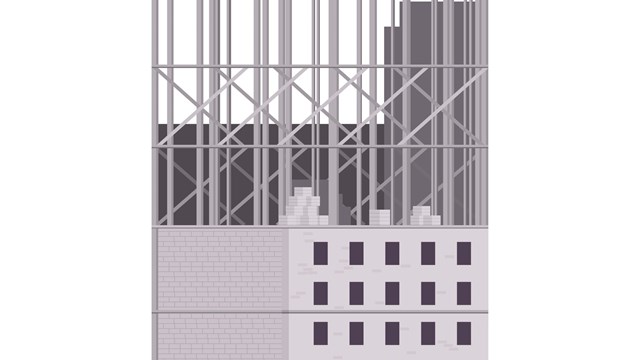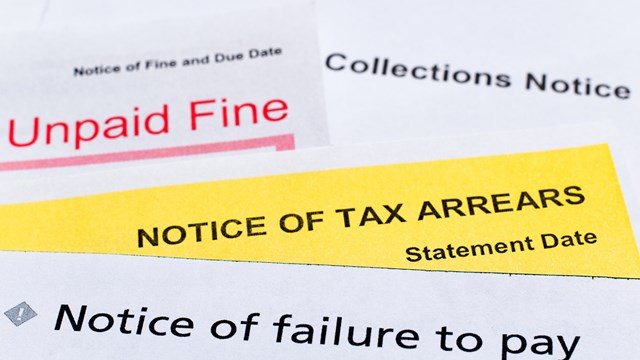Nothing remained in the New Jersey townhome after the owner, exasperated and struggling, financially picked up and left. And took everything with him. “Not only did he walk away, but he gutted his house,” says Joseph J. Balzamo, a president at Alliance Property Management LLC in Morristown. “He took the appliances, he took the electric, took the counter top, took the wiring, took the plumbing, took everything. It was a townhome, so nobody saw this from the outside. He took everything out of his house so it was just a box.”
Associations may also have to deal with residents not being able to pay their association fees, families staying longer in condos that are not being able to accommodate their needs in addition to the abandoned or foreclosed properties. “These situations are becoming more prevalent, when they used to be something that happened once in a while, limited to one area or one building, they are now more frequent,” says Nancy Hastings, CEO of MAMCO Property Management in Mount Laurel.
An August article in the New York Times said that New Jersey has the 15th highest rate of foreclosure in the country, with 3,576 houses either in the foreclosure process or already owned by the banks at the end of June 2012. One in every 106 housing units faces foreclosure in the Garden State which also has the second-longest time frame for completing the foreclosure process, behind New York, taking an average of 940 days, versus a national average of 378 days.
Throughout New Jersey, as foreclosures continue to increase, condo and homeowners association boards of directors must grapple with a variety of related problems.
Difficulty in Collecting
Faced with foreclosed or abandoned units can put a great financial burden on an association. “You have no way to collect them,” says Balzamo. “Banks have insured themselves from a situation where they don't have to sell the unit, they don't have to pay the maintenance fee on the unit, and then when they decide to sell the unit, they're only obligated to pay you six months' worth of maintenance fee, which is very detrimental to the building.”
If the property is in the bank's possession, they may decide to sell it, usually through an auction. But doing so can bring in a host of other problems. Going back to the stripped townhome, it was auctioned off for substantially less than it was worth but the new owner had to deal with it being gutted, says Balzamo. “The buyer doesn't know what they get. All that he sees is, I got this townhome in a beautiful community.”
Leniency vs. Fiduciary Duty
Before dispossessing delinquent owners, most boards will encourage them to erase their deficit. How can boards strike a balance between working with residents and putting their foot down? “It's called diplomacy,” says Brian Weaver, director of business development for Wilkin Management Group in Mahwah. “If you win the heart of the people, you have the ability to lead diplomatically. If you lack concern or care for the people, your decisions will be viewed as dictatorship,” he says.
Balzamo agrees saying, “the number one thing is at the end of the day, these people are your neighbors. They live in your community. They live in your building. And if you're not trying to work with them, you're going to have a problem.” He advises boards to try to work out financial situations with residents on an individual basis because everyone's circumstances are different.
Having a collection policy is something that all the industry experts advised. “The most important thing for the association is to have a fair, efficient and consistent collection policy in place that everyone knows about. The policy needs to be based on monetary and aging thresholds meaning it should not just be based on the amount of money owed but also the amount of time between payments or amount of the time that the past due balance has been sitting on the books,” says Hastings. “The association needs to have an approach where there are several opportunities for the homeowner to make payment plan arrangements before they compound the legal fees that might be required to pursue that delinquent account,” she says.
Balzamo continues to say that when a resident is a repeat offender of delinquencies or the problem because chronic, when boards should take a more hard-nosed approach, for which the procedure can again, depend on the circumstances. “Let's say it's an investor. The investor bought a condo in your building and he's renting the unit. Well, in that case you can go for other things. You can go for collections. You can accelerate maintenance fee. And you can get a receivership on the tenant or on the lease or the apartment. That's one way,” he says.
The association may also resort to restricting amenities in order to encourage payment or provide consequences for residents who are consistently delayed. “Sometimes associations may feel that there is a slippery slope that may occur in which one owner who is not paying whispers it to another owner and suddenly you have all these delinquencies because there are not repercussions. In some instances we've seen associations take a more aggressive approach and they are being forced into those actions because the delinquencies are impacting the association's ability to function properly.”
She says that revoking privileges is generally done as a last resort when associations have tried everything else but they are still in that circumstance where is they don't do something they will not be able to meet their obligations. All experts agree that the key is to work with residents first.
“There is generally a good reason why members do not pay,” says attorney A.Christopher Florio of the law firm of Stark & Stark in Princeton. “Most are not looking to skip out and not pay. Something has happened in the owner’s life that has disrupted his or her ability to pay. If the association can find out what it is that caused the disruption, accommodations may be able to be made so that some revenue starts to flow to the association with constant contact being kept with the owner to address the revenue stream as circumstances change for the owner.”
Coping with Absentee Owners
Owners who don’t actually live in the community pose other problems for its board. Some absentee owners leave because they lose a job and have to move away. If they haven’t abandoned their unit or home, they may rent it out. Others are investors who sought rental income and/or a profit upon an eventual sale. Either way, they tend to become disengaged from the building’s upkeep and repair needs. “If they are not periodically checking on the homes or there is not an inspection process in place, they could be causing damage to the unit or to other units, for example if there is a leak,” says Hastings.
Absentee owners may become another financial burden for a condo or co-op so it is critical to establish a collection policy. “What associations must do is have an aggressive accountability policy of requiring absentee owners to provide copies of leases each time a unit leased and to extent possible, have the tenant and the owner of the unit become contractually obligated to the association as it regards the rules and maintenance fees. This way if a default occurs, the tenant may also be contractually liable to pay the maintenance fees,” says Florio.
The Rental Dilemma
As the percentage of renters rises, the market value of individual units can be adversely affected, and prospective purchasers may have difficulty in securing a loan. The Federal Housing Authority, Fannie Mae, and Freddie Mac won’t approve financing in a building or community where residents own fewer than 51 percent of the units or homes.
Limiting the percentage of renters in a building or community is a double-edged sword. While it helps to make the units more saleable and financeable, it limits the options of existing owners. They complain that if they can’t rent their units, they won’t be able to pay their assessments and will have to sell at a loss. “Having the ability to rent your unit is a necessary exit strategy for some owners that are unable to sell and need to relocate to another location. By limiting an owner’s ability to rent, you could be minimizing the marketability of your home,” says Weaver.
Weaver continues to say that renting out a unit may provide some financial relief and pay back prior debts. “It is our opinion that obtaining a regularly paying customer is the highest goal in a collection matter. With that said, so long as the repair costs and expected time frame before the foreclosure finalizes supports it, obtaining the rent receivership is often a prudent decision,” he says.
Dealing with Foreclosed Units
The procedure for dealing with a foreclosure depends on whether the unit is a condo or coop.
“After the condominium forecloses and it gets ownership by virtue of shares deed and the owner is living there, then the owner is subject to removal by various court actions,” explains attorney David Byrne of Herrick Feinstein LLP in Princeton. “When a bank forecloses a mortgage, it is a lot quicker to remove an owner. A condominium lien foreclosure does not automatically have the right of possession whereas a mortgage does. So when you finish a condo foreclosure, you need to get an order for possession.”
“In a coop, a bank that forecloses gets the ownership of the stock and lease but does not have the right to put anyone into the unit,” says Jeffrey S. Reich, partner at Wolf Haldenstein Adler Freeman & Herz LLP in Manhattan.
He continues to say that, “a condominium, it is like a house and the bank could do whatever it wanted with the condo unit: they could put someone in it, generally they sell the unit and there could be a question of whether or not the condo has the right of first refusal with respect to the auction sale. In most cases, it does not. The bank holds an auction, whoever is the high bidder would not have to go through a right of first refusal and simply purchases the unit at the auction price,” he says.
In a coop that is not the case. “When a bank goes to foreclose on the coop, depending on the proprietary lease, the board may still have the right to approve or reject any occupant. So someone may be able to buy the unit but they may not have the right to reside in the unit unless they get the Board's approval,”Reich explains.
Bad Solutions
Faced with a cash-flow crunch and a budget shortfall, associations look desperately for ways to make ends meet. Bankruptcy and waiving reserve contributions are commonly suggested, but few associations actually do these things because they really don’t help.
Bankruptcy is like a Band-Aid on a gaping wound. It can discharge an association’s backlog of unpaid utility bills and other debts, but doesn’t solve the underlying problems that will lead inexorably to a new backlog.
Voting to waive contributions to the reserves can reduce assessments, but could make the property ineligible for federally guaranteed financing. Fannie Mae requires a reserve study and a minimum allocation of 10 percent of the association’s annual revenues to fund the reserves. The FHA and Freddie Mac have similar requirements, and so do many private-sector lenders.
When a Community Fails
What happens when a condo or HOA has so many units defaulting on assessments that it lacks money to operate?Several alternatives exist.
“In a condominium everyone owns the units so if there many people who are not paying, the association would theoretically have to cut its spending or raise everyone else's fees,” says Byrne.
“If the association finds itself in the position that it can not operate without raising fees and special assessing which results in the “good payers” carrying the load, an association may be faced with having to file a bankruptcy, or depending on the language within the governing documents, dissolve according to law and have the municipality take over some of the assets of the association: detention basins, roads, etc. None of the former options is a palatable one,” explains Florio.
Condos and coops throughout New Jersey and the country are faced with new and ongoing financial situations brought upon by the recession. With open communication, prudent financial planning and flexibility, Boards and residents will be able to ride out this post-recession wave.
George Leposky is a freelance writer and editor living in Miami, Florida, and is a frequent contributor to The New Jersey Cooperator. Editorial Assistant Maggie Puniewska contributed to this article.







7 Comments
Leave a Comment